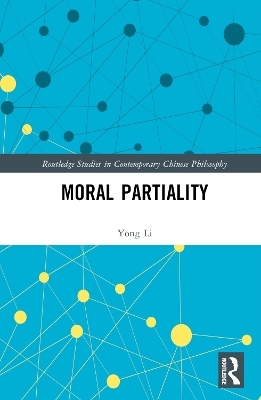
Moral Partiality
Seiten
2022
Routledge (Verlag)
978-1-032-30446-5 (ISBN)
Routledge (Verlag)
978-1-032-30446-5 (ISBN)
Situated within the framework of Confucian family-oriented ethics, this book explores the issue of familial partiality and specifically discusses whether it is morally praiseworthy to love one’s family partially.
In reviewing the tension between familial partiality and egalitarian impartiality from different perspectives while also drawing on binary metrics to understand the issue – that is, the weak and strong sense of familial partiality in Confucian moral theory – the author carefully discusses the efficacy of three major arguments to justify moral partiality. It is concluded that the tree argument fails to justify moral partiality in Confucianism, the evolutionary argument only justifies moral partiality in the weak sense that we should devote more resources to our family, and the care argument fails to justify moral partiality in the strong sense that family takes priority in any case even at the expense of the principle of justice. Seeking to address the quandary, the author advances an alternative argument based on Thomas Aquinas’ theory of love to interpret Confucian view of partial relationships, holding that partial treatment is assumed in partial relationships.
The title will appeal to scholars and students interested in Confucianism, Chinese philosophy, moral philosophy, and comparative philosophy.
In reviewing the tension between familial partiality and egalitarian impartiality from different perspectives while also drawing on binary metrics to understand the issue – that is, the weak and strong sense of familial partiality in Confucian moral theory – the author carefully discusses the efficacy of three major arguments to justify moral partiality. It is concluded that the tree argument fails to justify moral partiality in Confucianism, the evolutionary argument only justifies moral partiality in the weak sense that we should devote more resources to our family, and the care argument fails to justify moral partiality in the strong sense that family takes priority in any case even at the expense of the principle of justice. Seeking to address the quandary, the author advances an alternative argument based on Thomas Aquinas’ theory of love to interpret Confucian view of partial relationships, holding that partial treatment is assumed in partial relationships.
The title will appeal to scholars and students interested in Confucianism, Chinese philosophy, moral philosophy, and comparative philosophy.
Yong Li is Professor of Philosophy and Associate Dean of School of Philosophy at Wuhan University, China. He works primarily in ethics and political philosophy with focuses on Confucian ethics and comparative political philosophy. He serves as the co-editor for the book series "Routledge Studies in Contemporary Chinese Philosophy."
1. Introduction, 2. The Confucian Puzzle, 3. Evolutionary Arguments for Partiality, 4. Evolutionary Explanation of Partiality, 5. Care and Partiality, 6. Love and Partiality
| Erscheinungsdatum | 13.07.2022 |
|---|---|
| Reihe/Serie | Routledge Studies in Contemporary Chinese Philosophy |
| Verlagsort | London |
| Sprache | englisch |
| Maße | 156 x 234 mm |
| Gewicht | 426 g |
| Themenwelt | Geisteswissenschaften ► Philosophie ► Ethik |
| Geisteswissenschaften ► Philosophie ► Geschichte der Philosophie | |
| Geisteswissenschaften ► Philosophie ► Östliche Philosophie | |
| Geisteswissenschaften ► Philosophie ► Philosophie der Neuzeit | |
| Geisteswissenschaften ► Religion / Theologie ► Weitere Religionen | |
| Sozialwissenschaften ► Soziologie ► Spezielle Soziologien | |
| ISBN-10 | 1-032-30446-4 / 1032304464 |
| ISBN-13 | 978-1-032-30446-5 / 9781032304465 |
| Zustand | Neuware |
| Haben Sie eine Frage zum Produkt? |
Mehr entdecken
aus dem Bereich
aus dem Bereich
unsere kollektive Verantwortung
Buch | Hardcover (2023)
wbg Theiss in Wissenschaftliche Buchgesellschaft (WBG) (Verlag)
35,00 €


